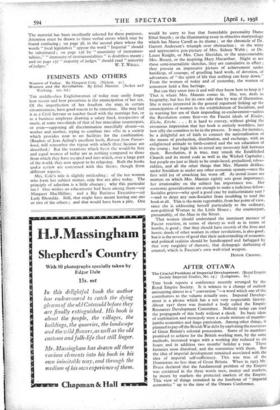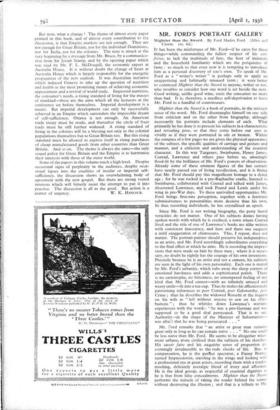AFTER OTTAWA
The Crucial Problem of Imperial Development. (Royal Empire Society Imperial Studies, No. 15.) (Longmans. 6s.) This book reports a conference recently arranged by the Royal' Empire Society. It is witness to a change of outlook amounting almost to a " conversion "—a word which one of the contributors to the volume actually uses. Imperial Develop- ment is a phrase which has a not very respectable history. About 1917 there was founded a body called the Empire Resources Development Committee. Nobody today can read the propaganda of this body without a shock. Its basic ideas of exploitation and monopoly were a crude mixture of mumbo- jumbo economics and jingo patriotism. Among other things, it planned to pay off the British War debt by exploiting the resources of Great Britain's colonial possessions. Some of its members promised to achieve for the British working man, by the same methods, increased wages with a working day reduced to six hours and in addition two months' holiday a year. These fantasies soon dissolved, and the committee with them. But the idea of imperial development remained associated with the idea of imperial self-sufficiency. This was true of the Dominions no less than of Great Britain. When in 1923 Mr. Bruce declared that the fundamental problem of the Empire was contained in the three words men, money and markets, he meant by markets the protected markets of the Empire. This view of things remained in the forefront of " imperial economics " up to the time of the Ottawa Conference. But now, what a change ! The theme of almost every paper printed in this book, and of almost every contribution to the discussion, is that Empire markets are not enough. They are not enough for Great Britain, nor for the individual Dominions, nor for India, nor for the colonies. The note is struck at the very beginning by a message from Mr. Bruce, by a communica- tion from Sir Josiah Stamp, and by the opening paper which was read by Mr. F. L. McDougall, the economic expert at Australia House. It is without doubt the change of heart at Australia House which is largely responsible for the energetic propagation of the new outlook. It was Australian initiative which induced Geneva to take up the question of nutrition and health as the most promising means of achieving economic appeasement and a revival of world trade. Improved nutrition, the consumer's needs, a rising standard of living for the masses of mankind—these are the aims which all the lecturers at the conference set before themselves. Imperial development is a means. But imperial development can only be successfully achieved in an Empire which surrenders the impossible dream of self-sufficiency. Ottawa is not enough. An American trade treaty must be made, and thereafter the circle of freer trade must be still further widened. A rising standard of living in the colonies will be a blessing not only to the colonial populations themselves but to Great Britain too. But this rising standard must be allowed to express itself in rising purchases of cheap manufactured goods from other countries than Great Britain. And so on. The theme is always the same—the only sound policy for Great Britain and the Empire is to harmonise their interests with those of the outer world.
Some of the papers in this volume reach a high level. Despite occasional signs of perplexity in the audience, despite occa- sional lapses into the crudities of insular or imperial self- sufficiency, the discussion shows an overwhelming body of agreement with the new gospel. But there are strong vested interests which will bitterly resist the attempt to put it into practice. The discussion is all to the good. But action is a















































 Previous page
Previous page